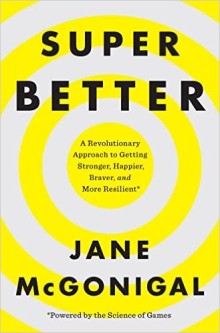 You remember Jane McGonigal, right? She’s the one who blends positive psychology with game design and hopes that a game designer will someday win a Nobel Prize. Her 2015 book SuperBetter extends that concept and explains, more or less, how to apply gamification to dealing with adversity and challenge.
You remember Jane McGonigal, right? She’s the one who blends positive psychology with game design and hopes that a game designer will someday win a Nobel Prize. Her 2015 book SuperBetter extends that concept and explains, more or less, how to apply gamification to dealing with adversity and challenge.
The concept, and the SuperBetter app that goes with it, came after McGonigal suffered a concussion from which she had great difficulty recovering. The first part of the book talks about positive psychology and video games, describing how video games are often helpful and healthy. The second section describes several rules for “being gameful†in your approach to challenges and all the other shit life can throw at you. Appropriately, these generally follow a video game motif, instructing you to adopt quests, seize power ups, and beat the bad guys.
Peppered all through this in asides and inserts are “Quests†where McGonigal asks you to take a moment to do something that illustrates what she’s talking about and increases some type of what she calls “resilience.†You may be asked to increase your social resilience by sending a kind note to someone, or improve your emotional resilience by looking out a window for a few minutes. Most of these little quests struck me as somewhat twee and goofy, but they seem pretty inseparable from the book’s methods and messages. The section of the book contains several applications of these quests and other lessons for specific “adventures†or things to do with the SuperBetter system. Think of them as playlists for particular moods or goals.
MgGonigal also inserts lots of “SuperBetter stories†into the chapters, which are testimonials and correspondences from SuperBetter users. I skimmed over all these, since they generally served to just repeat the lessons I had already read. I think they would have worked better if there were fewer of them and they had been incorporated directly into the main text.
Overall, I can see why this book is popular. The SuperBetter system is alluring and applicable to everyone, and apparently it works for at least some people. That’s awesome. McGonigal also has convivial style and seems like the kind of person you want cheering for you or helping you get through something tough –which is exactly what she does through this book. And I’m happy to say that despite the whole self-help aspect of the book and the eye rolling nature of some of the “quests,†McGonigal frequently drops some science by referencing proper research done at universities and published in peer reviewed scientific journals.